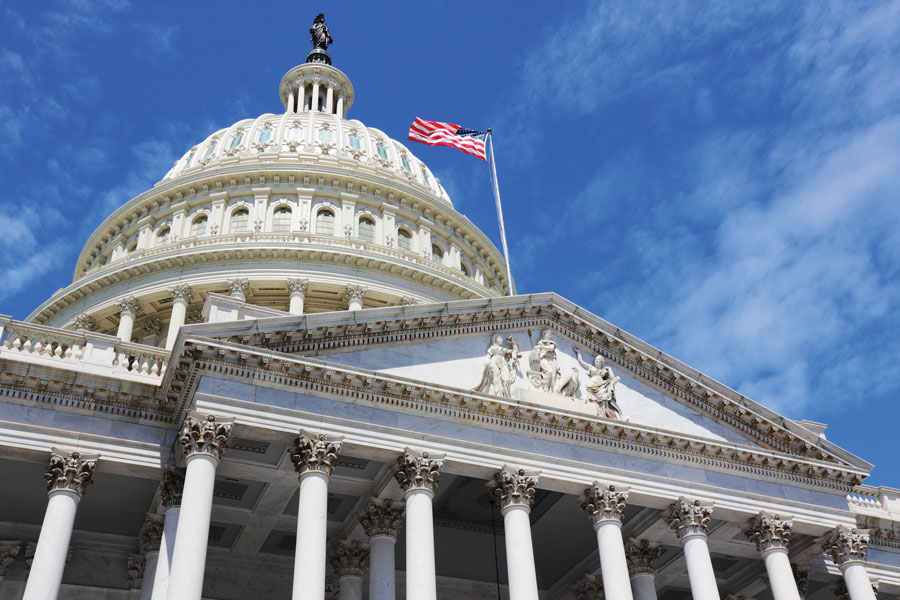

U.S. stocks stabilized in the green, though they remained well off session highs after protesters surged into the U.S. Capitol, forcing a lockdown that interrupted certification of the presidential election.
The S&P 500 trimmed its advance to 0.6% at the close of trading in New York, after rallying as much as 1.5% earlier Wednesday. Equities had been on track for a record, buoyed by speculation that a Democratic control of Congress could unleash a torrent of spending to revive growth. That sparked a reflation trade, with investors pouring into small caps and banks, companies that benefit from an economic rebound. Tech shares lagged behind.
The S&P 500 gained 21.28 points to close at 3,748.14, after having traded as high as 3,783.04 earlier. The Dow Jones Industrial Average closed at 30,829.04, up 437.80 points, after having traded as high as 31,022.65 earlier. The Nasdaq gave up all its earlier gains to close down 78.17 points at 12,740.79; earlier it had traded as high as 12,909.63.
Vice President Mike Pence left the floor of Congress as hundreds of protesters swarmed past barricades surrounding the building where lawmakers were debating Joe Biden’s victory in the Electoral College.
Meanwhile, Democrats claimed one of the two Senate seats contested in Georgia and led in the other tight race. Two wins would give Biden’s party control of Congress and smooth the path for some of his spending policies. That’s fueled bets that increased stimulus will boost the economy and spark inflation. The 10-year Treasury yield climbed past 1% for the first time since March, and the dollar fluctuated.
“The growth-into-value rotation may be reinforced after the results of the Georgia Senate election amid the prospect of a higher fiscal stimulus bill and steeper yield curve, which would benefit banks and other non-tech companies,” David Bahnsen, chief investment officer of the Bahnsen Group in Newport Beach, California, wrote in a note to clients.
Congress passed at year’s end a $900 billion spending deal to bolster an economy showing signs of slowing as the raging virus prompts stricter lockdowns across the country. The number of employees at U.S. businesses unexpectedly declined in December for the first time since April, underscoring the ongoing labor-market fallout from the pandemic. The figures preceded the monthly jobs report on Friday, which is projected to show weaker payroll growth.
Federal Reserve officials unanimously backed holding the pace of bond buying steady when they met last month. “All participants judged that it would be appropriate to continue those purchases at least at the current pace, and nearly all favored maintaining the current composition of purchases,” according to minutes of their Dec. 15-16 meeting published Wednesday.
U.S. 10-year breakevens -- a market gauge of inflation expectations over the next decade -- topped 2% this week for the first time since 2018, having gained in each of the last three months. While the pandemic is still raging with the rollout of vaccines in the early stages, the risk is that further signs of inflationary pressure could start prompting bets on Fed rate hikes.
For Matt Miskin, co-chief investment strategist at John Hancock Investment Management, the ball will be in the Fed’s court next and how policy makers will react to this evolving political backdrop.
“They have been wanting more fiscal support, well now they have it, and it is coming with a cost -- higher interest rates based on Treasury yields rising,” Miskin noted. “We will see what the Fed’s pain threshold is for higher Treasury yields in the first half of 2021. The tug-of-war between monetary and fiscal policy will be key to markets. While the fiscal side is looking more promising based on the results today, monetary policy may take a step back.”
Elsewhere, Bitcoin jumped to another all-time high as extreme swings continued to buffet the world’s largest cryptocurrency. And the New York Stock Exchange is proceeding with a plan to delist three major Chinese telecommunications firms, its second about-face this week, after U.S. Treasury Secretary Steven Mnuchin criticized its shock decision to give the companies a reprieve.

It's the mega-RIA firm's third $1B+ acquisition in just three months.

Wall Street leaders propose ways to monetize the mortgage giants.

Changes in legislation or additional laws historically have created opportunities for the alternative investment marketplace to expand.

A Texas-based bank selects Raymond James for a $605 million program, while an OSJ with Osaic lures a storied institution in Ohio from LPL.

The Treasury Secretary's suggestion that Trump Savings Accounts could be used as a "backdoor" drew sharp criticisms from AARP and Democratic lawmakers.
Orion's Tom Wilson on delivering coordinated, high-touch service in a world where returns alone no longer set you apart.
Barely a decade old, registered index-linked annuities have quickly surged in popularity, thanks to their unique blend of protection and growth potential—an appealing option for investors looking to chart a steadier course through today's choppy market waters, says Myles Lambert, Brighthouse Financial.
